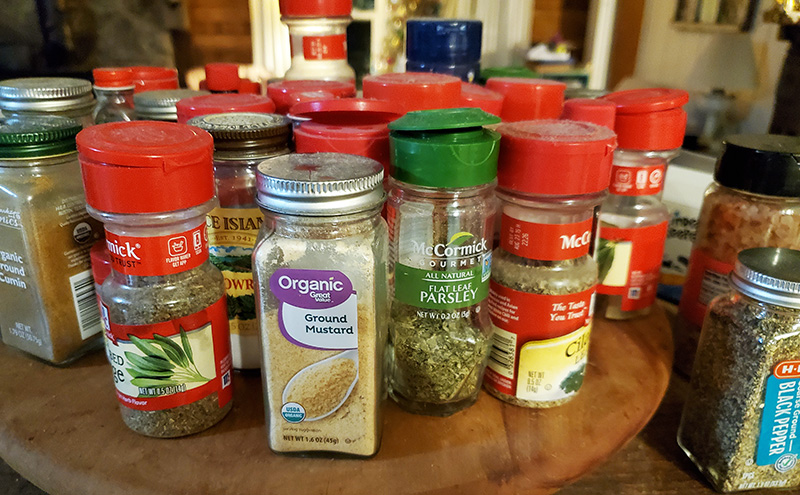
Our spices mock us
Dec 28, 2022–How many spices and seasonings do you have in your kitchen?
How many do you actually use?
I’m guessing those are wildly divergent numbers.
I’m working on a theory that the hidden culprit in unhealthy eating is the amount of seasoning we use.
Whenever I dine at a restaurant or prepare a frozen meal, I experience a seasoning hangover. The taste lingers in my mouth, coats my tongue, brings on heartburn and bloat, and causes a great thirst and bitter aftertaste.
This contrasts with how I cook for myself. My meat is un-sauced, my potatoes un-gravied, and my veggie, naked.
Spices are the mean girls in middle school–they flirt and entice and look attractive until you figure out they just want all the gangs to fight over them.
Look at world history.
For want of a spoon of saffron or a pod of cardamom, entire empires rose and fell, the slave trade flourished, and tax-financed armadas sailed off the edge of the world in search of new trade routes. Just so an inbred king could enjoy a pinch of paprika on his foie gras.
It is incredible to think we wouldn’t run across town for a spice that Portuguese speculators sent scurvy crews around the Cape of Good Hope to pillage from the East Indies.
They sailed all the way to India to stock up on ginger, nutmeg, mace, cloves, and cinnamon to put on their French toast.
The Portuguese pretty much ruled the spice world until the 1600s when the English ran them out. Then the Dutch pushed the British out of the spice racket completely, which we know just by tasting English food.
As with socket sets, I can’t count how many full racks of spices we’ve purchased over the years and then lost. Like buying an air fryer, we bring them home with visions of cooking up a healthy tsunami of crisp skinless chicken, aromatic spaghetti sauce, and piquant chili, freshly-made with basil and tomato from our garden. Two years later, there they sit, unopened, covered in dust, filled with moth eggs. Their presence mocks our Martha Stewart dreams, forcing us to shamefully toss them in the dust bin, remaining spiceless until the next Christmas white elephant gift exchange.
The only spice we require is salt. We all know it was once so valuable that in Rome it was the soldier’s pay, hence the word “salary.” It does have value–in preserving food, retaining body fluid, and enhancing the savoriness of a double meat cheeseburger.
But like other once-scarce commodities, we enjoy it too much. When I lamented the saltiness of take-out food, one veteran food worker confirmed my suspicions of overuse. They were told as new employees to salt a dish to their own taste, then add more salt as most customers are accustomed to salty food.
I learned long ago to forego movie theater and microwave popcorn, as the salt surfeit blistered my lips. Like my food and the original Olympic athletes, I prefer my snacks naked.
I’m convinced the overuse of spice is responsible for our holiday eating hangover.
So this year let’s all pledge to cook naked.
That should be enough spice for anyone’s holiday.